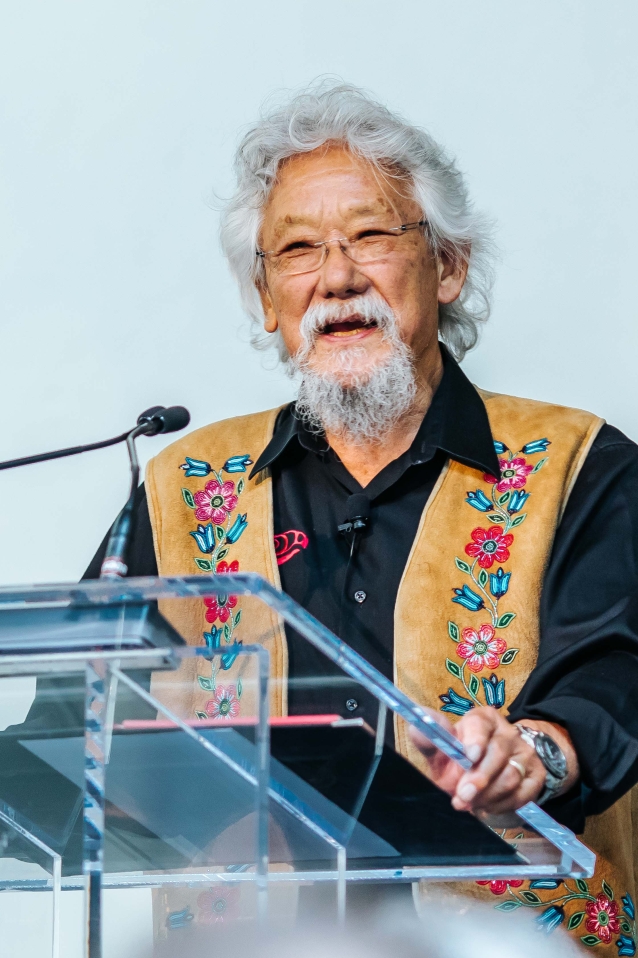Dr David Suzuki CC OBC Book as a speaker/entertainer for your next event
Key Points for Dr David Suzuki CC OBC
- Dr. David Suzuki is recognized as a world leader in sustainable ecology.
- Recipient of UNESCO's Kalinga Prize for Science, the United Nations Environment Program Medal and the Global 500.
- In 2009 won the Right Livelihood Award that is considered the alternate Nobel.
- Environmental activist.
- Co-founder of David Suzuki Foundation .
- Published over 56 books.
Topics for Dr David Suzuki CC OBC
- The Covid Crisis
The Covid-19 crisis has had two enormous and related consequences: 1) brought much of human activity to a halt and 2) given nature a respite from human activity. Both provide an opportunity to reset society's priorities and to head in a different direction.
Confrontation with the reality of a new epidemic has subdued political and economic imperatives to scientific reality. In a time of accusations of fake media, deep conspiracies and relentless trolls, scientists have regained authoritative prominence. Confined and restricted from normal lifestyles, people have had to confront important questions about purpose, values, opportunities and constraints in the way we as individuals and societies live.
Nature - air, water, soil, energy, biodiversity - is the very source of our lives and well-being, but in the 20th century, humanity changed from rural agricultural living to inhabitants of big cities where our highest priority became our jobs. And so, the economy assumed greatest prominence in our values and we failed to ask the most important questions about this human creation called the economy, namely:- what is an economy for?
- where does nature fit in an economy?
- what is the value of nature and the spiritual?
- what are the limits?
- how much is enough?
- are we happier with the sheer quantity of consumer items?
The lockdown also reveals the way we care for elders who are often castigated as a "drain on the economy", expendable and a nuisance. We see unmet fundamental needs of isolated Indigenous communities, of the poor and street people. This is our moment to reset our priorities.
In the battle for action on climate change, we have often been stymied by the lack of funds, yet governments find enormous resources to bail out automotive and fossil fuel industries in economic downturns. It is astounding to see how the Covid-19 crisis has opened new avenues of spending without dissent about increasing deficits or overspending.
I lived through two other remarkable crises- World War II and the Soviet launch of Sputnik - both of which resulted in enormous economic and technological benefits for humankind and both deserves to be discussed.
Finally, the restriction of human activity during the lockdown has not only given us clean air and silence, nature has shocked us with its resilience. This is the ultimate lesson, that nature can be far more forgiving than we deserve. So post Covid-19, let's continue to allow her to recover and put our efforts into living green and creating jobs that restore Earth's sustainable productivity.
- The challenge of the 21st century: Setting the bottomline in the anthropocene
In the past century, humanity has undergone an explosive change in numbers, science, technology, consumption and economics, that have endowed us with the power to alter the biological, physical and chemical properties of the planet. It is undeniable that the atmosphere and climate are altered; air, water and soil are fouled with toxic pollutants; oceans are depleted; forests are being cleared; and species are disappearing. Now that most people live in large cities, our relationship with nature is less obvious. Computers and telecommunications fragment information so that we can no longer recognize the interconnectivity of everything in the world. Globalization of the economy renders the entire planet a source of resources and all people a market for products, while local communities and local ecosystems are negatively impacted (for example, large scale pig farms are raised in Canada for an Asian market while the water, air and soil surrounding the hogfarms are negatively impacted). Traditional people refer to the Earth as their “Mother” and tell us we are made of the four sacred elements: Earth, Air, Fire and Water. Today science is verifying this ancient wisdom and defines a different set of priorities that should become our bottomline for the 21st century:- We are biological beings with an absolute dependence on clean air, water, soil and sunlight for our well being and survival.
- The web of all life on Earth (biodiversity) is responsible for cleansing, replenishing and creating air, water, soil and captured sunlight.
- Diversity at the genetic, species, ecosystem and cultural level is critical for longterm resilience and adaptability.
- We are social animals with an absolute need for love to realize our full human potential; maximal opportunity for love is ensured with strong families, communities, full employment, justice, equity, freedom from terror and war.
- We are spiritual beings who need to know that there are forces that impinge on our lives that lie outside our understanding or control; that nature that gave us birth, will persist after we die; that there are sacred places where humans come with respect and reverence.
Human beings are one species among perhaps 10 to 15 million other species on whom we are ultimately dependent for our well being. Humanity needs to rediscover humility and our place in the world so that we and the rest of life can continue to flourish. The way we see the world shapes the way we treat it. Perspective is shaped by our values, believes and experiences.

